| |||||||||||||||||||||||||||||
376 members of the Electoral College 189 votes needed to win | |||||||||||||||||||||||||||||
|---|---|---|---|---|---|---|---|---|---|---|---|---|---|---|---|---|---|---|---|---|---|---|---|---|---|---|---|---|---|
| Registered | 2,672,750 | ||||||||||||||||||||||||||||
| Turnout | 76.17% | ||||||||||||||||||||||||||||
| |||||||||||||||||||||||||||||
 Most voted party by province. | |||||||||||||||||||||||||||||
| |||||||||||||||||||||||||||||
The Argentine presidential election of 1937 was held on 5 September 1937.
| |||||||||||||||||||||||||||||
376 members of the Electoral College 189 votes needed to win | |||||||||||||||||||||||||||||
|---|---|---|---|---|---|---|---|---|---|---|---|---|---|---|---|---|---|---|---|---|---|---|---|---|---|---|---|---|---|
| Registered | 2,672,750 | ||||||||||||||||||||||||||||
| Turnout | 76.17% | ||||||||||||||||||||||||||||
| |||||||||||||||||||||||||||||
 Most voted party by province. | |||||||||||||||||||||||||||||
| |||||||||||||||||||||||||||||
The Argentine presidential election of 1937 was held on 5 September 1937.

The 1931 elections (boycotted by the previous ruling party, the centrist Radical Civic Union) proved to be a precedent for the 1937 elections, called to replace outgoing President Agustín Justo. Justo had ruled as an enlightened despot, subordinating national policy to entrenched commercial interests and encouraging systemic fraud in gubernatorial and legislative polls held in 1935, while also promoting record public works spending. His administration initiated the nation's first paved intercity roads, Buenos Aires' massive Nueve de Julio Avenue, and the University of Buenos Aires School of Medicine, among other works. Even as it recovered from the great depression, however, Argentina's increasingly urban and industrialized social profile bode poorly for the ruling Concordance, an alliance dominated by the conservative, rural landowner-oriented National Autonomist Party (who held power from 1874 to 1916). [1]
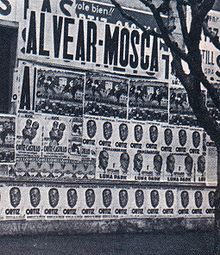
The movement which displaced them in 1916, the centrist, urban-oriented Radical Civic Union (UCR), turned to Marcelo Torcuato de Alvear for leadership following the military overthrow of its long-time leader and Alvear's rival, Hipólito Yrigoyen, in 1930. The scion of one of Argentina's traditional landed families and President from 1922 to 1928 (when his alliance with Yrigoyen soured), Alvear was respected largely for challenging Yrigoyen's personality cult (hence his reputation as the leading "Antipersonalist") and for his decision to boycott the 1931 election, given its uneven playing field. [2] [3]
Negotiations between President Justo and Alvear, who was allowed to return from exile, led to the UCR's lifting of its electoral boycott and to its resurgence by its election in 1936 of Amadeo Sabattini as Governor of Córdoba Province as well as victories in Tucumán Province and in Legislative elections (where despite Justo's orchestrated fraud, they obtained 56 of 158 seats - one more than the Concordance's Congressional stand-ins, the National Democrats). [4] [3]
The UCR nominated the elder statesman its standard bearer in 1937. A seasoned campaigner, Alvear made a compelling choice for his running mate, former Congressman Enrique Mosca. A vocal opponent of the 1930 Coup d'état despite his differences with President Yrigoyen, Mosca spent the next three and a half years in Ushuaia's notorious prison (now a museum). Alvear was not universally supported by Argentine progressives, however, and he failed to secure the endorsement of Arturo Jauretche's influential pro-industrialization political action committee, FORJA. Alvear was also deprived of a strong potential ally when the leader of the Democratic Progressive Party (PDP), Lisandro de la Torre, resigned from the Senate in protest over his inability to thwart the prevailing climate of corruption and impunity. His running mate in 1931, Nicolás Repetto, accepted the Socialist Party's nomination. Senator de la Torre's attempted assassination and the 1936 removal of the PDP's sole governor, Luciano Molinas of Santa Fe Province, became poster children of the "patriotic fraud" that set the stage for the 1937 elections. [5]
President Justo left his party's nomination to its most influential voice, British commercial interests. Dominating his administration's trade and budgetary policies since the Roca-Runciman Treaty of 1933, they advanced the lead attorney for one of the largest British-owned railway carriers as the ruling party's nominee: Roberto Ortiz. Their considerations outweighed others in the party, whose conservatism clashed with the pragmatic Ortiz. The talented lawyer assuaged tensions at the party's July convention by choosing Ramón Castillo, an ultraconservative lawmaker from then-feudal Catamarca Province, as his running mate (this seemingly token gesture was quite significant: Ortiz suffered from advanced Type II diabetes). [6]
Flouting his 1935 gentlemen's agreement with Alvear, Justo kept his political and security forces occupied on election day, September 5. Amid widespread reports of intimidation, ballot stuffing and voter roll tampering (whereby, according to one observer, "democracy was extended to the hereafter"), Ortiz won the elections handily. [7] One of the beneficiaries of the system of "patriotic fraud" advanced during the "Infamous Decade," Buenos Aires Province Governor Manuel Fresco, himself termed the 1937 Argentine general elections as "one of the most fraudulent in history" [8] (Fresco was himself removed by President Ortiz's decree in 1940 at the behest of ultraconservatives). [9]
| Presidential candidate | Vice Presidential candidate | Party | Popular vote | Electoral vote | |||
|---|---|---|---|---|---|---|---|
| Votes | % | Votes | % | ||||
| Roberto María Ortiz | Ramón Castillo | Total Concordance | 1,097,660 | 55.77 | 248 | 65.96 | |
| National Democratic Party (PDN) | 612,075 | 31.10 | |||||
| Antipersonalist Radical Civic Union (UCR-A) | 253,480 | 12.88 | |||||
| Concordance | 125,223 | 6.36 | |||||
| National Front | 58,991 | 3.00 | |||||
| Liberal Party (PLCo) - Autonomist Party (PACo) | 33,709 | 1.71 | |||||
| Popular Party of Jujuy | 14,182 | 0.72 | |||||
| Marcelo Torcuato de Alvear | Enrique Mosca | Radical Civic Union (UCR) | 814,750 | 41.39 | 128 | 34.04 | |
| Nicolás Repetto | Arturo Orgaz | Socialist Party (PS) | 50,952 | 2.59 | |||
| Diego Luis Molinari | Adolfo Rocco | Radical Party | 2,585 | 0.13 | |||
| No candidates | Blockist Radical Civic Union (UCR-B) | 2,270 | 0.12 | ||||
| Provincial Defence–White Flag (DP-BB) | 63 | 0.00 | |||||
| Total | 1,968,280 | 100 | |||||
| Positive votes | 1,968,280 | 96.68 | |||||
| Blank votes | 52,069 | 2.56 | |||||
| Tally sheet differences | 15,490 | 0.76 | |||||
| Total votes | 2,035,839 | 100 | |||||
| Registered voters/turnout | 2,672,750 | 76.17 | |||||
| Source: [10] | |||||||

Agustín Pedro Justo Rolón was an Argentine military officer, diplomat and politician, who served as the president of Argentina from 1932 to 1938 during the Infamous Decade. Justo took part in the coup of 1930, becoming president two years later thanks to widespread electoral fraud. His presidency was part of the period known as the Infamous Decade, which lasted from 1930 until 1943. He established the country's central bank and introduced a nationwide income tax.
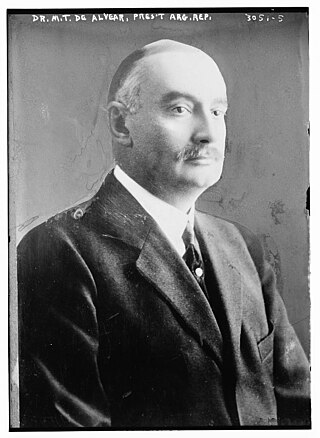
Máximo Marcelo Torcuato de Alvear Pacheco, was an Argentine lawyer and politician, who served as president of Argentina between from 1922 to 1928.
Amadeo Tomás Sabattini was an Argentine politician. He served as Governor of Córdoba from May 17, 1936, to May 17, 1940.

Leopoldo Melo was an Argentine lawyer, diplomat and politician. He was a leading figure in the Radical Civic Union, a nominee for president, and later minister of the interior.

Vicente Carmelo Gallo was an Argentine lawyer, academic, politician, and member of the Radical Civic Union and the Antipersonalist Radical Civic Union.

The Argentine general election of 1931 was held on 8 November.

The Argentine general election of 1928 was held on 1 April, with a turnout of 80.9%.

The 1922 Argentine general election was held on 2 April 1922, in which Marcelo T. de Alvear was elected to the office of the president representing the Radical Civic Union (UCR). Voter turnout for the election was 55.3%, with the UCR garnering a plurality at 51% of the popular vote and carrying 9 of the 14 provinces of Argentina.

Nicolás Repetto was an Argentine physician and leader of the Socialist Party of Argentina.

General elections were held in Argentina on 2 April 1916. Voters elected the President, legislators, and local officials. The first secret-ballot presidential elections in the nation's history, they were mandatory and had a turnout of 62.8%. The turnout for the Chamber of Deputies election was 65.9%.
Argentina held nine presidential elections between 1862 and 1910, every six years.

José Pascual Tamborini was an Argentine physician, politician, and presidential candidate.

Enrique Mosca was an Argentine lawyer and politician prominent in the centrist Radical Civic Union (UCR).

Félix César Luna was an Argentine writer, lyricist and historian.

Argentine legislative elections of 1912 were held on 7 April 1912 for the Argentine Chamber of Deputies. The first free, democratic elections in the nation's history, the contest had a turnout of 73%.
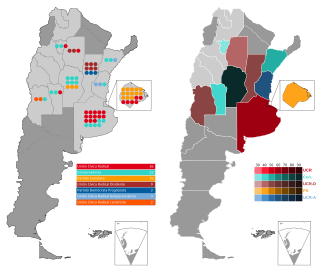
The Argentine legislative elections of 1924 were held on 2 March. Voters chose their legislators and numerous governors, and with a turnout of 44.2%.
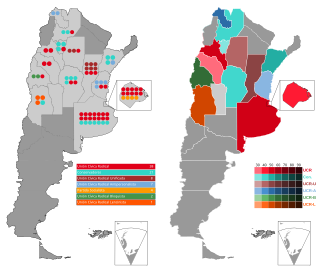
The Argentine legislative elections of 1926 were held on 7 March. Voters chose their legislators and numerous governors, and with a turnout of 49.2%.

Mario Humberto Nicolás Bravo was an Argentine politician and writer.
The Concordancia was a political alliance in Argentina. Three presidents belonging to it, Agustín P. Justo, Roberto Ortiz, and Ramón Castillo were in power from 1931 to 1943, a period known in Argentina as the "Infamous Decade."
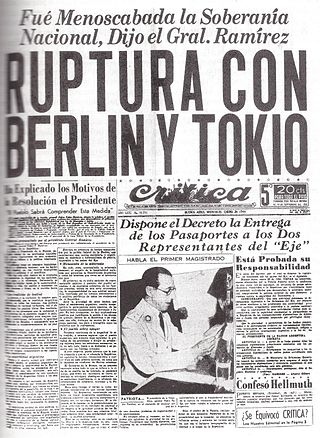
Before the start of World War II in 1939, Argentina had maintained a long tradition of neutrality regarding European wars, which had been upheld and defended by all major political parties since the 19th century. One of the main reasons for this policy was related to Argentina's economic position as one of the world's leading exporters of foodstuffs and agricultural products, to Europe in general and to the United Kingdom in particular. Relations between Britain and Argentina had been strong since the mid-19 century, due to the large volume of trade between both countries, the major presence of British investments particularly in railroads and banking, as well as British immigration, and the policy of neutrality had ensured the food supply of Britain during World War I against the German U-boat campaign. At the same time, British influence over the Argentine economy was resented by nationalistic groups, while German and Italian influence in Argentina was strong and growing mainly due to increased interwar trade and investment, and the presence of numerous immigrants from both countries, which, together with the refusal to break relations with the Axis as the war progressed, furthered the belief that the Argentine government was sympathetic to the German cause. Because of strong divisions and internal disputes between members of the Argentine military, Argentina remained neutral for most of World War II, despite pressure from the United States to join the Allies. However, Argentina eventually gave in to the Allies' pressure, broke relations with the Axis powers on 26 January 1944, and declared war on 27 March 1945.